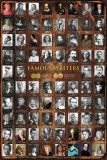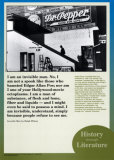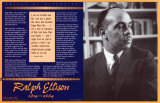Ralph Waldo Ellison Posters, Books, Videos, Links for Learning
|
|||||||||||||||||||||||||||||
|
literature > black history > RALPH WALDO EMERSON < famous men < social studies |
|||||||||||||||||||||||||||||
|
Ralph Ellison Ellison only published three books during his life. Yet he is one of the greatest writers of the 20th century, and some say his novel Invisible Man is the most important American work written after World War II. Ralph was born in Oklahoma City. His family was poor, but his parents encouraged him, and he saw himself as a “Renaissance man” who could accomplish anything. Ralph's father died when Ralph was young. His mother worked as a maid for white families and brought home old books, magazines, and records. Mr. Ellison said that these things “spoke to me of a life which was broader and more interesting – and of a word which I could some day make my own.” Ralph read everything from fairy tales to Freud, but he thought he would grow up to be a musician. He studied music and played the trumpet at Tuskegee Institute in Alabama, but a mix-up over his scholarship caused him to leave school and move to New York City in 1936. On his second day there, he met the poet Langston Hughes, who introduced him to the novelist Richard Wright. Soon, Mr. Ellison began writing reviews and short stories. Then in 1945, he wrote down these five words: “I am an invisible man.” These words became the beginning of his masterpiece. Invisible Man is about an African American man who feels invisible because people can't see who he is beyound the color of his skin. Although the novel centers on racial issues, it is also about feeling cut off in modern society – regardless of race. Mr. Ellison drew this writing style from authors like James Joyce and Ernest Hemingway, as well as from African American folklore and jazz and blues music. In 1953, Invisible Man wone the National Book Award, making Mr. Ellison the first African American author to win this prize. Despite the success that Invisible Man brought him, Mr. Ellison's second novel, Juneteenth, wasn't published until five years after his death. Still, there is no denying the force of his impact on our society. Writing, he said, “offers me the possibility of contributing not only to the growth of the literature, but to the shaping of the culture as I should like it to be.” |
|||||||||||||||||||||||||||||
RALPH WALDO ELLISON QUOTES ~ RALPH WALDO ELLISON Invisible Man by Ralph Ellison - Invisible Man is a milestone in American literature, a book that has continued to engage readers since its appearance in 1952. A first novel by an unknown writer, it remained on the bestseller list for sixteen weeks, won the National Book Award for fiction, and established Ralph Ellison as one of the key writers of the century. The nameless narrator of the novel describes growing up in a black community in the South, attending a Negro college from which he is expelled, moving to New York and becoming the chief spokesman of the Harlem branch of “the Brotherhood”, and retreating amid violence and confusion to the basement lair of the Invisible Man he imagines himself to be. The book is a passionate and witty tour de force of style, strongly influenced by T.S. Eliot’s The Waste Land, Joyce, and Dostoevsky. Juneteenth: A Novel by John F. Callahan, Ralph Waldo Ellison - The long awaited second novel from Ralph Ellison-author of the classic novel of African-American experience, Invisible Man. Here is the master of American vernacular - the rhythms of jazz and gospel and ordinary speech - at the height of his powers, telling a powerful, evocative tale of a prodigal of the twentieth century. Ralph Ellison: Emergence of Genius by Lawrence Patrick Jackson - Author, intellectual, and social critic, Ralph Ellison (1914-1994) was a pivotal figure in American literature and history and arguably the father of African American modernism. Universally acclaimed for his first novel, Invisible Man, a masterpiece of modern fiction, and, more recently, for Juneteenth, Ellison was recognized with a stunning succession of honors, including the 1953 National Book Award. Yet, despite rich literary accomplishment and important friendships, political activism, and historical impact, Ellison’s life has never been the subject of a biography. He has received surprisingly sparse treatment by biographers of other leading American literary figures, historians, and social critics. Here, for the first time, is a thoroughly researched biography that tells the coming-of-age story of one of the most gifted and influential writers of our time. Powerfully enhanced by rare photographs of Ellison, this long-deserved examination draws from archives, literary correspondence, and interviews with Ellison’s relatives, friends, and associates. Tracing his path from poverty in Dustbowl Oklahoma to his rise among the literary elite, Lawrence Jackson explores the author’s relationships with other stars, particularly Langston Hughes and Richard Wright, and examines his never-before-documented involvement in the Socialist Left of the 1930s and ’40s, the black radical rights movement of the same period, and the League of American Writers. The result is a fascinating portrait of a fraternal cadre of important black writers and critics–and the singularly complex and intriguing man at its center. The critical success of Invisible Man would bring a flood of honors: the 1955 Prix de Rome from the American Academy of Arts and Letters, the Medal of Freedom, bestowed by Richard Nixon in 1969, an honorary doctorate from Harvard in 1974, and election to both the National Institute of Arts and Letters and the American Academy of Arts and Letters. This exceptional biography reveals to readers a man whose mark on an art–and a people–has far transcended the trophies bestowed on him. [from the front flap] Ralph Ellison and the Raft of Hope: A Political Companion to Invisible Man (Lucas E. Morel, editor) - An important new collection of original essays that examine how Ellison's landmark novel, Invisible Man (1952), addresses the social, cultural, political, economic, and racial contradictions of America. Commenting on the significance of Mark Twain's writings, Ralph Ellison wrote that “a novel could be fashioned as a raft of hope, perception and entertainment that might help keep us afloat as we tried to negotiate the snags and whirlpools that mark our nation's vacillating course toward and away from the democratic ideal.” Ellison believed it was the contradiction between America's “noble ideals and the actualities of our conduct” that inspired the most profound literature – “the American novel at its best.” Drawing from the fields of literature, politics, law, and history, the contributors make visible the political and ethical terms of Invisible Man, while also illuminating Ellison's understanding of democracy and art. Ellison hoped that his novel, by providing a tragicomic look at American ideals and mores, would make better citizens of his readers. The contributors also explain Ellison's distinctive views on the political tasks and responsibilities of the novelist, an especially relevant topic as contemporary writers continue to confront the American incongruity between democratic faith and practice. Ralph Ellison and the Raft of Hope uniquely demonstrates why Invisible Man stands as a premier literary meditation on American democracy. Ralph Ellison: Living With Music-Various Artists; Audio CD - Ralph Ellison (1914-1994) was one of America’s most accomplished writers and intellectuals. Jazz and the blues heavily influenced his novels (Invisible Man, Juneteenth) and essays. This CD, produced by Ellison scholar Robert G. O’Meally, the author of Living with Music: Ralph Ellison’s Jazz Writings, compiles many of Ellison’s favorite jazz selections. There’s Louis Armstrong’s rendition of the Andy Razaf/Fats Waller classic, “(What Did I Do to Be So) Black and Blue,” and Duke Ellington’s ragtime-fringed and dirge-like numbers, “East St. Louis Toodle-oo”? and “Black and Tan Fantasy,” representing the multihued American democracy Ellison championed. Count Basie’s “Moten Swing” and Jimmy Rushing’s “Harvard Blues” recall Ellison’s driving, wide-open Oklahoma City musical heritage, as does the down-home, spiritual vocals of Billie Holiday and Mahalia Jackson. The lone spoken word on this collection is a 1964 tape of Ellison reading from his essay, “Hidden Name and Complex Fate.” As O’Meally writes in his liner notes, “This collection echoes the work of Ellison the trumpet player and composer-in-training who became a writer, and offers Ellisonian equipment for those deciding not only to shun the noise but to live with the momentum implied in jazz music.” Ralph Ellison: Self-Taught Writer–VHS Tape - Africans in America: America’s Journey Through Slavery (1998 VHS) - groundbreaking six hour series of surprising revelations, dramatic recreations, rare archival photography and riveting first-person accounts. Africans in America helps define the reality of slavery’s past through the insightful commentary of a wide range of voices, including General Colin Powell and leading scholars, and offers unparalleled understanding - from slavery’s birth in the early 1600s through the violent onset of civil war in 1860. Narrated by Angela Bassett; includes the voices of William Hurt and Andre Braugher. Winner 1998 Peabody Award. LINKS FOR LEARNING : RALPH ELLISON
|
|||||||||||||||||||||||||||||
|
|
|
|
|
NPW home | Global PathMarker Collection | APWTW Blog | faqs-about | contact | search | privacy |
|
NetPosterWorks.com ©2007-2015 The Creative Process, LLC All Rights Reserved. |
last updated










